The Stacks Anniversary Ask Me Anything
How I pick books to cover on the show, lost episodes, and a few lessons I've learned along the way.
Quick reminder before we start, I need your help to pull off Stack the Shelves, the pop-up bookshop we’re hosting for those impacted by the LA fires. I need donations, volunteers, and so much more. Check it out below.
We’re keeping The Stacks’ 7th anniversary party going with a little “Ask Me Anything” as submitted by you all from Instagram, Patreon, and Substack. Please be warned, this is a very long one today. If you’re reading via email you might need to click over to read it on the app or via your website browser.
So many of you sent over great questions, and I couldn’t get to them all. I did my best to answer the most common questions and the ones that I don’t get asked as often. Thank you to everyone who submitted questions. More than that though, thank you all for being here and being part of The Stacks community. I love it here, and I’m happy to know you do too1.
And, if you like what you read here, or just any of the word I do, please consider joining as a paid subscriber so I can continue to do the work I do and so that I can write free posts like this one.
Episodes of The Stacks
What is one The Stacks Book Club (TSBC) picks that truly surprised you?
Our second ever book club pick was Men We Reaped by Jesmyn Ward, and at the time I read it, March 20182 I didn’t know much about Jesmyn Ward. I had just heard of the book and the premise seemed interesting. I was stunned that a memoir could do what Men We Reaped did with form and structure. Seems obvious now that a book by Jesmyn Ward would be great, but at the time I had no idea what I was getting into.
Are there any lost episodes of the Stacks?
There is one with the LadyGang from June 2020. It was back when I was on their network and they were about to release their first book, Act Like a Lady. We recorded the episode in early May, and then George Floyd was murdered, and then you remember the rest. I felt really pressed because I didn’t want to release that episode. Luckily, LadyGang understood the moment agreed. We scrapped that and instead read White Fragility3 and discussed it in two parts as a sort of impromptu book club. Part one on their feed. Part two on The Stacks feed. We released those episodes and the original interview haver never seen the light of day.
I know you’ve talked about this some, but how do you pick books to feature vs books to book club? How do you find the books? How many come from what is sent in a marketing push vs. what you buy of your own interest? Do you have a book savant of your own? How do you decide when to talk about something that isn’t brand new? What’s the process of selection look like with the bookclub guests? I’ve been surprised to some degree when you feature a book/author on an episode and then later mention it wasn’t something you loved (Annie Bot and The Ministry of Time for example). I love hearing your honest opinion but it has made me very curious about the whole selection process. I’d love to know the nitty gritty details!
Ok, this is a lot of questions, I am going to try and work through this question by question.
How do you pick books to feature vs books to book club?
As far as picking a book to feature versus book club, I pretty much only feature new books4. There have been a few exceptions, but not many. For book club I am not restricted by release date or ability to interview the author. In both cases though, I try to pick books and authors I am interested in. There is no real formula. I am paying attention to variety of book types, genres, author identities, but mostly I am working off what sounds good and interesting to me and my guest (if it is for book club).
How do you find the books? How many come from what is sent in a marketing push vs. what you buy of your own interest? Do you have a book savant of your own?
I try not to be too swayed by book mail and publisher pitches. If I look at last year’s production calendar, only six guests were from pitches alone, as in I didn’t have any idea I would have them on the show until their team pitched me. Another six came from me picking up the book and reading it just cause and loving it so much that I bedded to have the author on the show. The rest, 21 guests, came from me researching and following my nose on the book and authors I thought I would like.
I don’t have a book savant, but a lot of bookish friends and sources. I rely on fellow online book people, authors, publications, and The Stacks community to keep me abreast of the books coming out.
How do you decide when to talk about something that isn’t brand new?
I rarely talk about books, outside of book club, that aren’t brand new5 or paperback new. We did it once with Blood in the Water because it was our book club pick that month, and because it was the book that inspired the whole podcast.
What’s the process of selection look like with the bookclub guests?
The process to pick a book club book is varied. More often than not, once I have a guest, I ask them to send over 3-5 books that they might want to discuss. I tell them something along the lines of this:
As far as book club goes we need to come up with a book we want to discuss. It can be something you know and love (or hate) or it could be something completely new to you, or something you have been meaning to read. It can be genre, nonfiction, fiction, whatever is exciting to you.
Then from there I might send over a list of titles based on what they sent. We might go back and forth. Sometimes I pick from their list. There are other times where I might tell they guest we need to pick a deep backlist title if we have done a few more recent reads in recent months. Or nonfiction if we’ve done a lot of fiction lately.
There are other times I know for sure that there is a book I want to discuss, or I invite a guest to discuss something specifically, like Imani Perry to talk Toni Morrison. So it just really depends on the person.
I’ve been surprised to some degree when you feature a book/author on an episode and then later mention it wasn’t something you loved (Annie Bot and The Ministry of Time for example).
As far as featuring books I didn’t love, it happens. To be clear I really liked Annie Bot, a lot. I read it and immediately reached out to have Sierra Greer on the podcast. That doesn’t mean that I won’t have critique of the book. But mostly I thought what she did with it was interesting and would make for good conversation. There are also times when something (or someone) is relevant to the cultural conversation I will have them on even if their book wasn’t for me.
When it comes to book club picks, I love when we pick a book I don’t end up liking. That is what makes a book club fun. Having a diversity of opinions and critique of the work, which is what happened with The Ministry of Time. J wanted to read it for book club, I said yes, and then I ended up not liking it.
Is there a book you regret choosing for book club?
This pairs nicely with the above question, and the answer would be no. I feel like there are books I didn’t like but generally the book club conversations add so much to the reading of the book, I don’t care about that. There have been some picks that didn’t lead to particularly interesting conversations, and that is a bummer. I am thinking of the episode on The Four Agreements, for example.
If you could speak to any person about any book who would be the book and person?
Whatever book Barack Obama wants to talk to me about.
Some of your all time favorite podcast episodes?
To honor the seven year anniversary, I’ll just give you seven episodes that stand out to me as particular favorites for a variety of different reasons.
This book club episode with
about Imani Perry’s Breathe remains a favorite because it was the first time I felt like I/we realized what I had imagined the book club episodes could be.The discussion of Passing by Nella Larsen with
was just so much fun, gabbing with a pal about a juicy novel.When I finished recording this episode with
on abortion rights, I knew right away is would be favorite. She offered up so many fresh and clear arguments on a conversation that has become deeply muddied.Damaris B. Hill gave us all a stunning master class on Beloved and I will be forever grateful for her generosity on leading the way with this one.
Love him or hate him, I am really proud of this interview with Quentin Tarrantino.
I am so deeply obsessed with Mariame Kaba (
) and both of her episodes were fantastic, but in the interest of sticking to the seven episode lists, I’ll only put part one here.I loved getting to ask some “tough” questions of Andrea Elliott around the ethics of journalism. I also love that this is one of the most cited episodes whenever I have nonfiction authors on the podcast.
I am so curious to hear from you what your faves have been over the years.
The Business of Podcasting/The Stacks
What’s the biggest misconception about you/The Stacks?
That I get to read all day. I get so little reading time during the work day. My job is mostly on the computer. I am writing, recording, listening back to interviews, emailing, generally taking care of business. I can maybe sneak some reading in an hour a week during normal business hours.
What are your favorite and least favorite parts of being self-employed? What kinds of goals do you set for yourself, professionally, and how do you balance focusing on those goals while still taking advantage of new/unexpected opportunities as they come? (I swear I'm not trying to sound like a job interview, I just love hearing about the experiences of other self-employed folks!)
The thing I love most about being self employed is getting to make the things that I want to make. What I like least is that everything falls on me. Sometimes I just don’t want to write or read or do anything, and I have to because it is my business and if I don’t do it, I can’t pay the incredible people who make The Stacks work.
It can feel like a lot of pressure.
I am a short term goal setting person but not a long term goal setting person. I might have a goal for the year, like last year I wanted to do more in person book festivals and events. But I’m not good at stacking goals or creating a vision for what comes next. I so badly wish I was good at that. It gets at another thing I don’t love about being self-employed. I wish I had a boss who could help me plan out what my career path should look like. Is that a boss or a fairy godmother?
Mostly, I do what I need to do (weekly episodes, paid content expectations) and then stay open for opportunities that are interesting to me.
Will we get a Stacks Tour round two?
I would love to go on tour again. No plans for that anytime soon. I had so much fun, but that was a lot of work and I don’t know that I can take on a project of that size at the moment.
How do you decide what to make a bonus episode vs. regular episode. I’m thinking especially when they are author interviews.
In my mind, bonus episodes are a place to talk about anything I want to talk about. There are less rules and structure, and I can try new things with them. Mostly they are different from regular episodes6, but every once in a while they will be super similar to author interviews and in those cases it might just be that I was able to book a guest a little late and didn’t want to miss out on talking to them. More recently though, even with bonus episodes that are an author interview I try to focus it around something broader than just the book. Like the recent episode with Emily St. James. She wrote Woodworking which we talked about, but the episode was more focused on trans representation and politics.
After 7 years, is it challenging to think of guests to have on the show?
Not really, there are always books I want to read and authors I want to interview, so the general author interview episodes are easy to book. Though I can struggle balancing bigger name guests with debuts or lesser known authors because that impacts the numbers side of things. Sometimes it can be hard to pick book club books and find non-author guests to be on the show.
Is this your only full time job? If yes, how long did it take, and how did you do it?
This is my only full time job. It was a side job for me for a little over two years. Then in 2020 COVID and the Mini Stacks made it so I couldn’t go back to my other job (teaching indoor cycling) or take on childcare, so I made The Stacks7 my only job. That was also the same time that white people discovered racism due to the murder of George Floyd and decided to support Black creators. So that meant more listeners and bigger audience and more advertisers willing to put money into Black artists and creatives8. It was the perfect storm for me to commit to this as my job.
What are you most proud of from making the podcast?
The Stacks community. It is not possible to communicate what it means to me to know that this little book podcast has connected so many people to each other. I get chills when I think about people meeting up all over the place and going to author events together. I get emotional when I think of the money we’ve raised, or the advice and support I see shared between members of The Stacks Pack about therapy, gardening, child loss, book organizing, you name it. It is more than I can really comprehend. I am proud and I am grateful.
Reviews
Tips for becoming a better critical reader.
I have two tips.
Think as you go. I am always asking myself as I read what is the author doing here and why? Is it working.
Don’t be shy. Clearly communicating what works and doesn’t work for you in a book is extremely powerful. Some of our best critics are not writing at the New York Times, they are the children and elders around us who tell it like it is and distill things down to their true essence.
I would also check out
’s writing on these subject because she is has put in so much more thought than I have when it comes to criticism9.Does writing all the time now changed the way you approach critique?
No. I have been extremely critical all my life. Writing is just a new place to put my thoughts, a place I do not like and do not think I am particularly good at10. No matter the forum though, when it comes to critique, I am always trying to be honest, generous, casual, and maybe if I’m really lucky, a little entertaining.
I honestly didn’t fully grasp that other people were not hypercritical until relatively recently. I just thought everyone else was a hater but had better home training so they kept their thoughts to themselves.
As a child my mom would take me to see Broadway shows on tour in San Francisco, and after the show would end I would be giving full opinions of choreography and acting choices and the story. Both good and bad. My mom would be like “oh no, I’m sorry you didn’t like it, I thought it was good”. And I would get so annoyed, because I felt misunderstood. I did like the show, sure, but I was really there to talk about the show with her. To relive every moment — nitpicking and gushing — was what I loved most about seeing theatre. The talking about the thing was the real catharsis for me, not the show itself.
I am always operating on this level11. And I guess I always have.
Book Related
How do you make time to read with 2 kiddos?
I don’t get to watch a lot of TV or movies. I read early in the morning and after the Minis go to bed. I feel lucky if I get an hour or two of reading in in a day. Sometimes on the weekend I can sneak in bigger chunks of reading time, but recently that hasn’t been the case. I bring a book everywhere I go and hope I can grab a few minutes here or there to read. I am lucky because if I absolutely have to read something on a deadline, I can block out time in my work day to do it. I also rely on audiobooks to help me read when I can’t be holding a book, so while I’m cooking or folding laundry or driving somewhere.
Who are some of your favorite editors?
Kathy Beldin at Scribner is the GOAT. She edits Kiese Laymon, Jesmyn Ward, and so many other faves. She is the gold standard to me.
Some other editors I think are really good include Jackson Howard (FSG), Nicole Counts (One World), Jenny Xu (Washington Square Books), Pilar Garcia-Brown (Duttton/Tiny Rep), Amanda Cook (Crown), Bill Thomas (Doubleday), Jordan Pavlin (Knopf), Katy Nishimoto (The Dial Press), Maya Millet (Random House), Simon Boughton (Norton Young Readers), and Yahdon Israel (Simon & Schuster).
Do you think you will ever write a book?
I don’t want to. It might happen. But I have no plans for it. I think the most I could see happening is me editing an anthology from my favorite writers. I think that could fun.
Everything Else
Why don't you like the musical Les Miserables? You mentioned this once on a story and I've been waiting for an AMA ever since 😂
There is not enough dancing. It is too long. There are only two good songs.
Your top 5 MCs? (emcees, not main characters)
Not in order, but Kendrick, Tupac, Jay-Z, Wayne, Nikki.
I know, this is very millennial coded, but you asked for my top 5 not the top 5.
Do you miss teaching cycling? Your classes were so fun!
Yes. I do so badly. I loved making playlists and getting paid to exercise. I miss my classes and my riders. I also miss being in that level of cardio shape. At one point I was teaching 8-12 45-minute spin classes a week. Ugh, those were the days.
Who are your most inspiring friends and how do they inspire you in life and work?
I am really lucky to be surrounded by amazing humans. My friends are so talented, smart, and thoughtful. One thing I always look for in any relationship is generosity, if you’re stingy with one thing, you’re stingy with everything. I will share three friends with you, but this list is not even close to exhaustive.
My dearest pal Chris Ford is a theatre maker and Lortel nominated scenic designer who is making weird plays in NYC. He is the person I sharpened my critical eye with. We would see shows in college and then talk about them for hours12. Chris has taught me so much about talking about art and the world critically. I am beyond inspired by his ability to make things from scratch. He has vision and the skills to execute. He also cares deeply about details, which I think is a dying art.
Sam Pinkelton, another college pal, is a Tony nominated choreographer and director. Sam is goals when it comes to balancing business savvy with creative integrity. He makes things that are big and bold and feel good. Sam is the dreamiest brainstorm partner13. He can sit with an idea and let it percolate and develop and spin out in ways few people I know can.
My friend and sister, Sarah Fong, is a professor, and I am so inspired by her ability to evolve her thinking. She is constantly developing new vocabulary on how she moves through the world.
Alright, y’all that was really fun. It was also a lot. If you made it to the end. Thank you. You’re a real one. Thank you for making seven years of The Stacks possible.
If you want more of me and my nonsense be sure to listen to The Stacks podcast every Wednesday and follow me over on Instagram for a lot more book content.
You can earn a free subscription to Unstacked by sharing it with the people in your life. Just tap the button below and spread the word.
This post contains affiliate links. If you make a purchase through the links above, I may earn a small commission at no additional cost to you.
Or at the very least, hate it here enough to hate read my shit. I respect the grind.
I read it before we ever dropped an episode of the show, so I was very newly (read: not) plugged into the book world at that time.
Say what you want about that book, but I think it is a great tool for white people and I continue to recommend it to this day. Obviously it is not the *only* book I recommend, but it is one of many.
Could be brand new or paperback release.
Within that first year of publication.
At least in my mind.
And parenting premie twins in a pandemic.
Much of that has dwindled which is why subscribing at a paid tier is so important for me to continue to do what I do.
She puts more thought into everything than I do, let’s be real.
I am just as critical of myself as I am of other people. I know good writing, this ain’t it.
One of my favorite kinds places to critique story and design is restaurants. Like how many different lighting fixtures do they have? How is the bathroom set up? What are the waitstaff wearing? Restaurants are theatre productions, I don’t care what anyone says.
He is also the person who taught me to look at lighting in restaurants.
If you came to the tour you can thank him for the post-its.




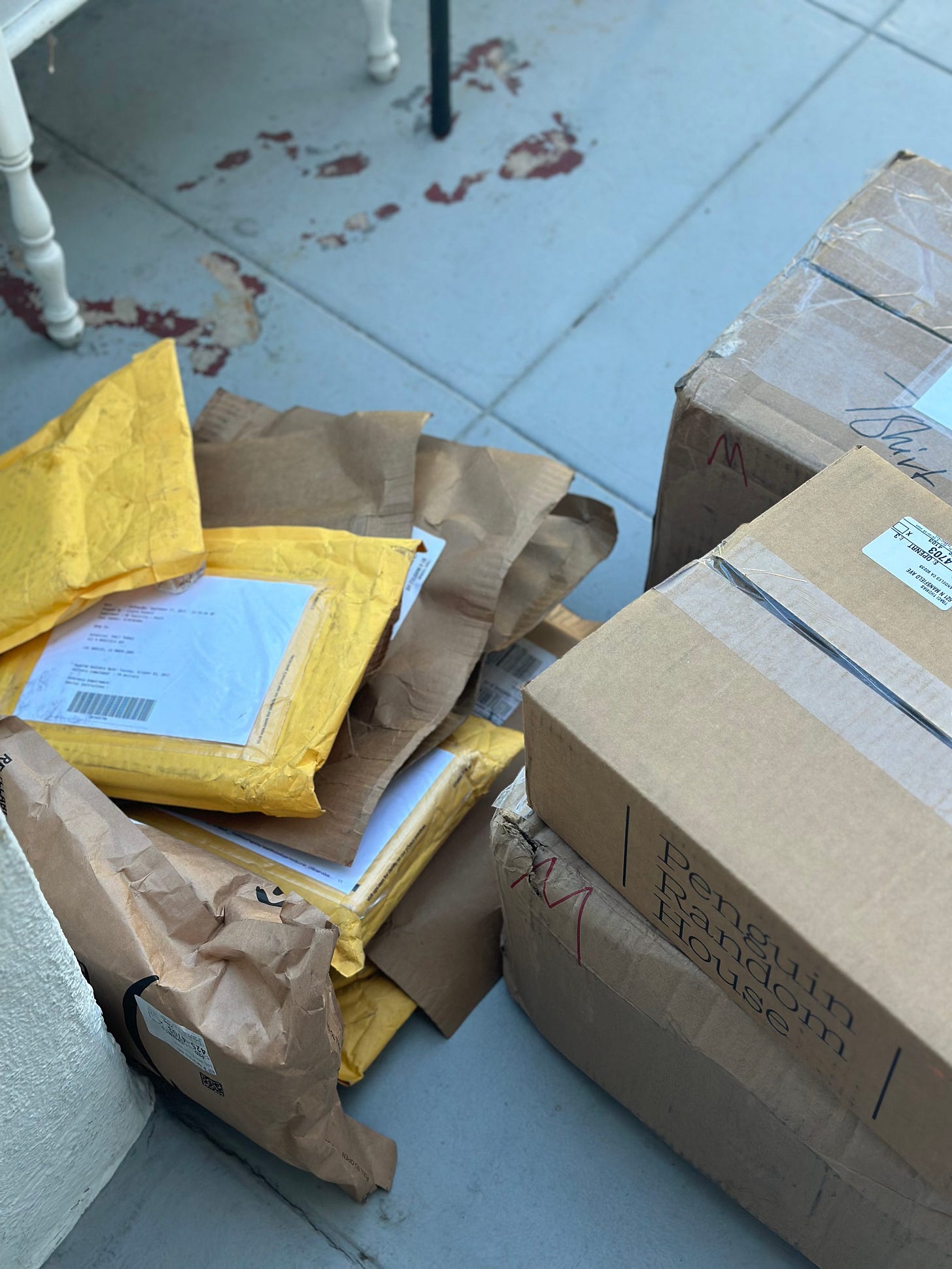
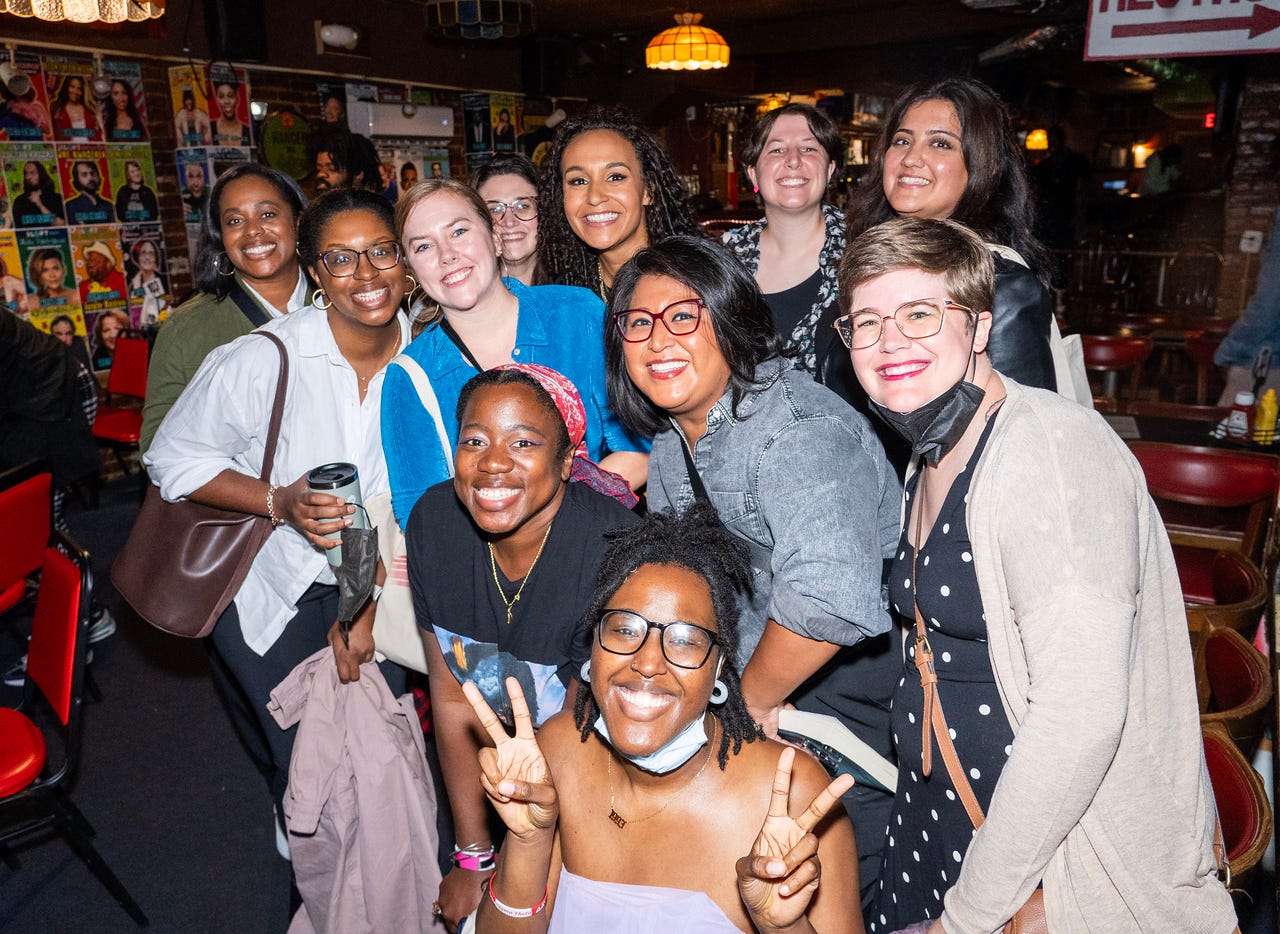
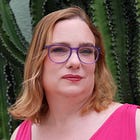
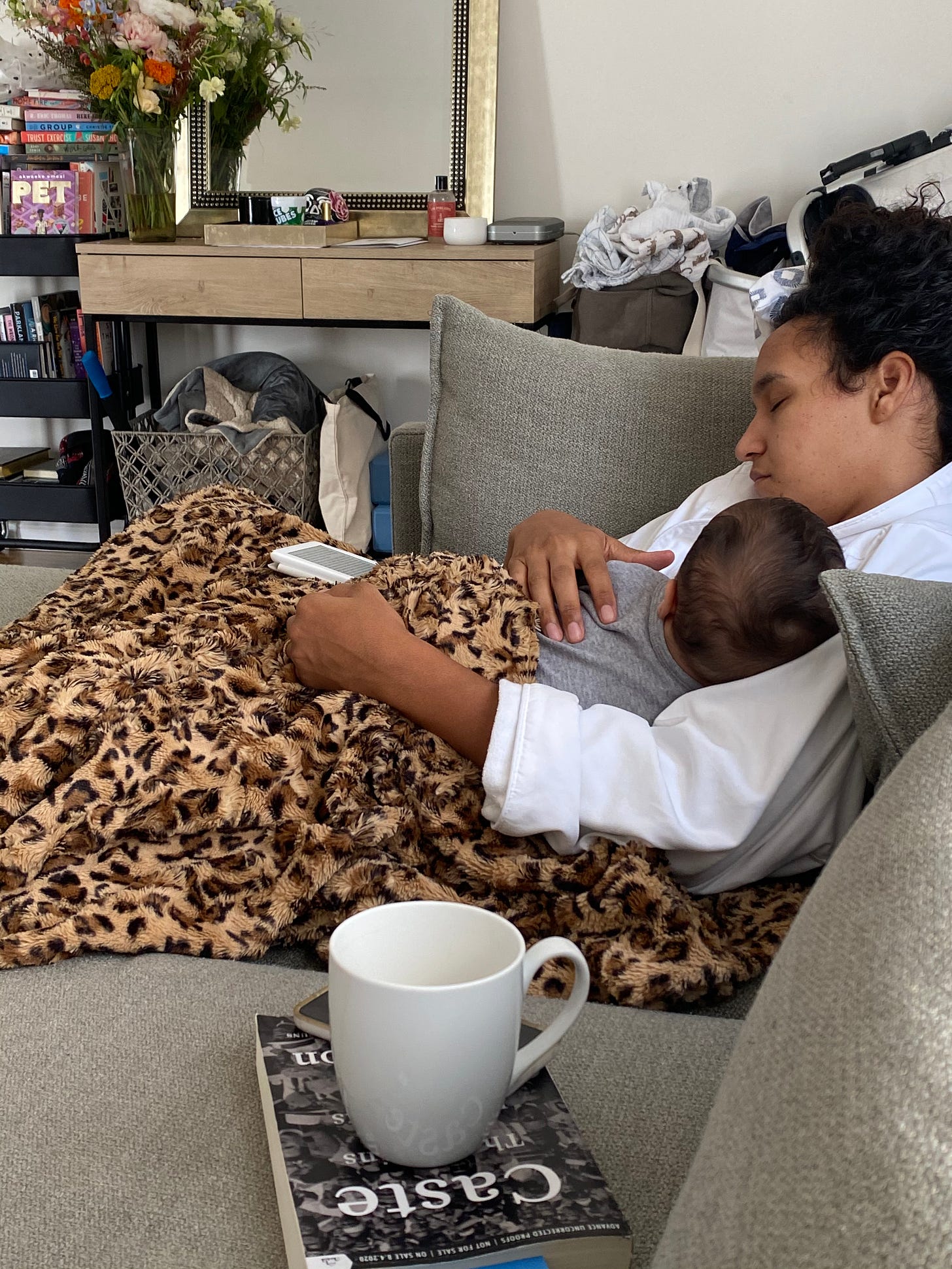
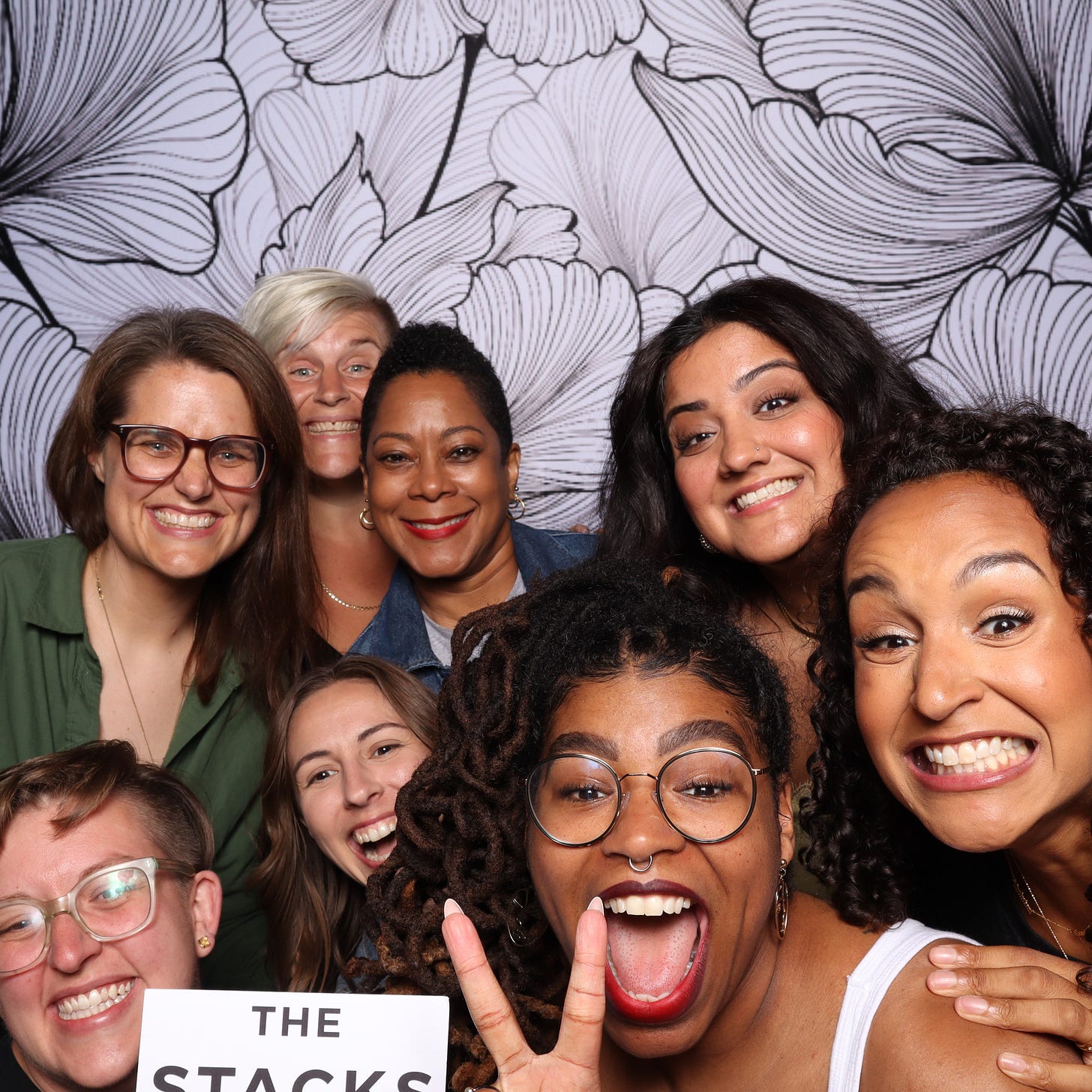

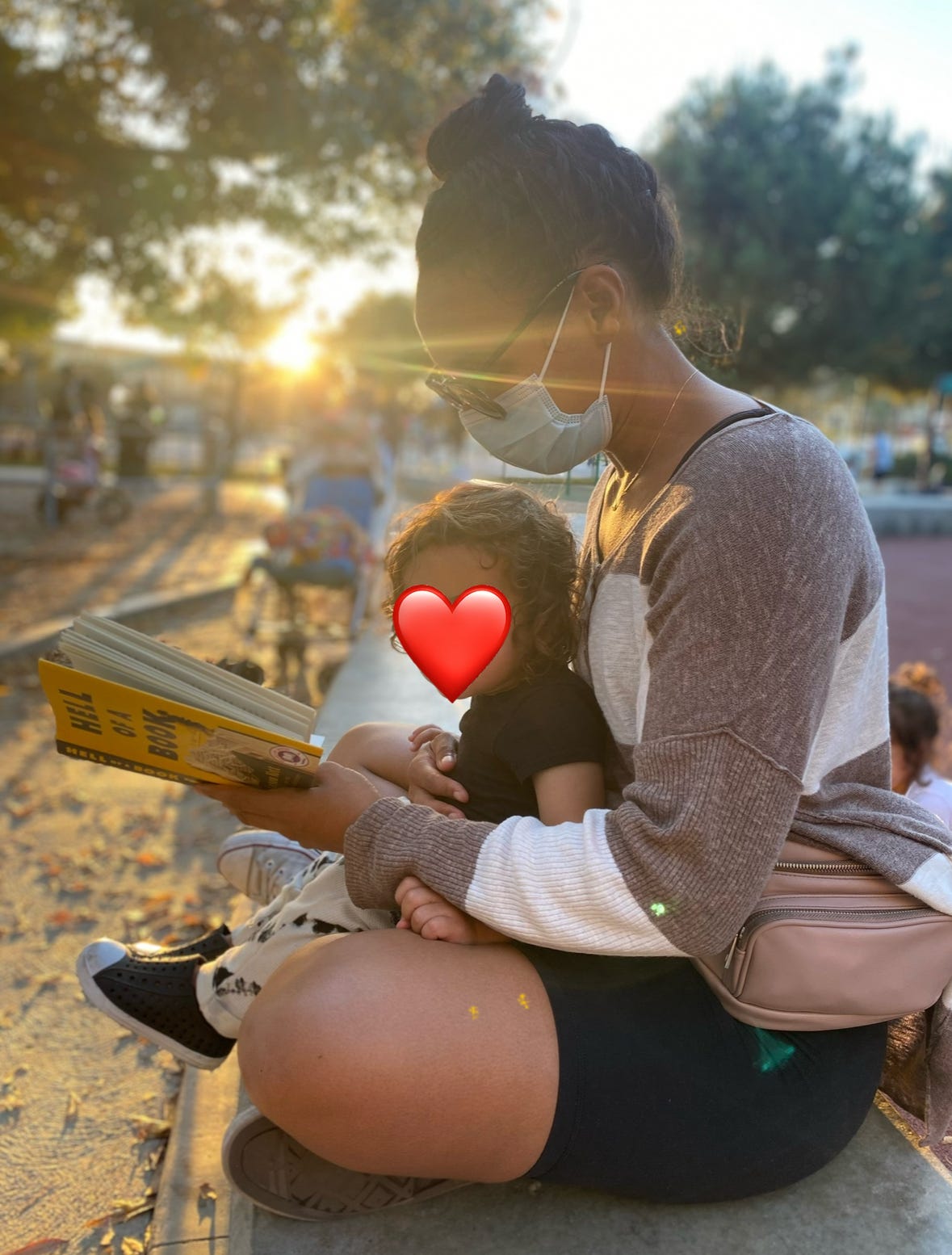


Amazing. Simply amazing
I loved discovering authors and new favorite books thanks to the episodes, the conversations were so interesting they made me want to pick the book up : Patrick Radden Keefe, Amanda Montell, Clint Smith, Ari Shapiro, just to name a few !! I would have never heard of them without you, and for that, I am grateful !